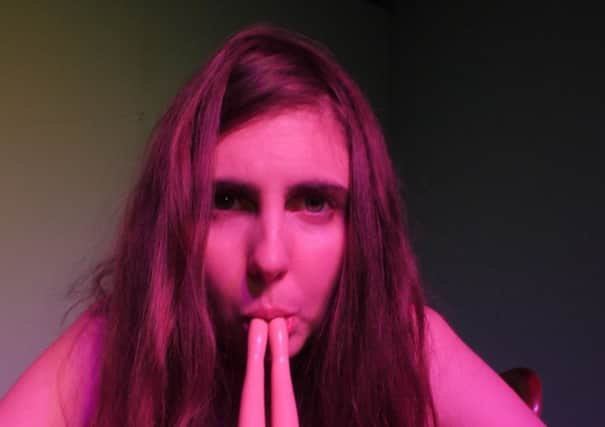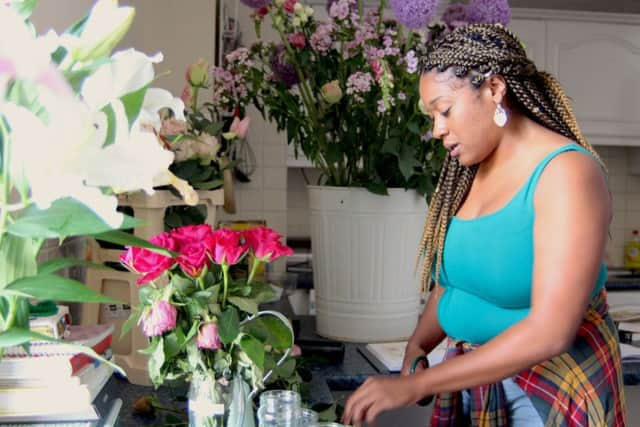Edinburgh Fringe 2018: Shows tacking power dynamics of sex offer rich drama


Power Play: Somebody, Pleasance Pop-Up: Power Play HQ (Venue 330) ****
Power Play: Funeral Flowers, Pleasance Pop-Up: Power Play HQ (Venue 330) ****
Advertisement
Hide AdAdvertisement
Hide AdPower Play: Next Time, Pleasance Pop-Up: Power Play HQ (Venue 330) ***


Power Play: The Empty Chair, Pleasance Pop-Up: Power Play HQ (Venue 330) ***
Baby Paradise: Part One, C royale (Venue 6) ****
Baby Paradise: Part Two, C royale (Venue 6) ****
I’ve been handed a postcard. “It’s to highlight the systemic inequality in theatre,” a young woman tells me. “Do you think we could sell it?”
“You can sell anything at the Fringe,” a man queuing replies.
A buzzer goes off. It’s time to enter the tenement block. And while the laid-back charm of a pop-up political theatre group continues inside, it’s paired with some contrasting sharp writing.
Power Play: Somebody, by Matilda Curtis, starts in the kitchen – a real one in a real flat, complete with crumbs and cereal boxes on the side. A young woman’s boyfriend has proposed and both he and the London Gay Men’s Choir are poised for her to say yes. However, she’s as unsure about this as she is about the fact her best friend’s having a baby and moving to Botswana.
Performer Dani Moseley is as close and believable as any real-life person you might be having a conversation with, round at their house. Curtis’s writing pertinently captures the young woman’s horror, at her friend becoming pregnant, in a way that is rarely depicted on stage. Indeed, the skilfully structured and wittily observed script is full of lesser-heard truths and everyday honesty – the kind that is so often obliterated by the clichéd narratives of motherhood, diamond rings and white weddings endlessly promoted to women.
Advertisement
Hide AdAdvertisement
Hide Ad• READ MORE: Edinburgh Fringe 2018: 10 theatre shows you must see
“Not having children is the most logical decision of my life,” the woman says, but as we travel back in time through the flat, what seems like a story about one person’s choice is peeled back to reveal a more complex tale of lost love, limited opportunities but, ultimately, a celebration of life and how lucky we are to have it, as well as the journeys we take to get to the decisions we make.
Half an hour later, back in the same flat for Power Play: Funeral Flowers there’s a new form of life: pink roses, white lilies, exotic blooms – hundreds of them in the most unlikely of places, their peachy perfume uplifting and intoxicating.
“Everyone pick one, yeah?” says a teenager, bopping nervously about. This is Angelique. She’s doing flower arranging at college in a vocational class full of kids who have dropped out elsewhere. However, she really wants to be a florist – a job that represents the kind of niceness-for-niceness sake that, it becomes increasingly clear, is, in places, severely missing from her own life.
Written and performed by Emma Dennis-Edwards with warmth and compassion, but also an unblinking eye, we follow Angelique through the flat and into the arms of Mickey, an older gang member who has the ability to make her forget her dreams and her savings. He tells her that his “boss” Rampage wants to “fill her up” – and if she doesn’t agree she’ll be designing his funeral flowers.
When a video is released, Angelique is blamed for “getting it together with two guys”, rather than them for exploiting and abusing her. As a response, she turns on her likeable gay carer, Kim, and, as one kind of ugliness morphs into another, we are left waiting and willing this bright but in some ways broken young woman to become the boss not only of a floristry shop, but her own life. When she finally does, it’s a powerful moment – one from someone who describes herself as “more a weed than a flower” but concludes: “I’m still here.”
The final two plays in the series are more static, both literally – as we stay in one room for each of them – but also dramatically, as they focus more on single issues, over shorter periods.
Advertisement
Hide AdAdvertisement
Hide AdPower Play: Next Time, by Jess Moore is the most disturbing. Here, there is also a vase of flowers – but this one has been smashed. In the corner, a young woman cowers, surrounded by the aftermath of some kind of outburst. On a notice board, a playful postcard proclaims, “I like gin and voting”, but there is nothing fun or frivolous about the mood in here.
Francesca Isherwood gives a powerful but emotionally gruelling performance as the unnamed woman, who it gradually becomes clear is in an abusive relationship. The woman’s sparse, fragmented, dialogue is mimicked by broken, initially banal, then increasingly horrifying messages from a man on an answerphone, as a refrain from You Sexy Thing endlessly repeats. The real-time pace creates the feeling of being in a troubling live art installation at times, as the room offers clues about a woman who has surrounded herself with messages of female empowerment and yet is unable to put them into practice.
There is something unsettling about simply showing abuse in this way, without offering any real hope for its victim, other than the vacuous slogans that she tries and fails to embrace – although the fact she’s trying at all perhaps means something. However, as she repeats that she “doesn’t feel safe” in her home and footsteps approach the door, we are given a small taste of the fear that stifles and controls her.
• READ MORE: Edinburgh Fringe 2018: 10 comedy shows you must see
It doesn’t feel like things will get any easier when we are warned, at the start of Power Play: The Empty Chair that there will be “extended descriptions of sexual assault”. Even the company seem concerned that I have decided to see all four plays in one day (“it’s probably going to be a bit intense”).
However, this piece, by Polly Creed, starts with the relaxed mood of a glamorous Hollywood aftershow party back at someone’s flat. Inevitably the conversation turns to the #MeToo movement and the four actors – three women and one men – reveal they have each had “experiences” with the same man, ranging from, at best, being coerced into doing something they’d rather not and, at worst, raped.
The free-flowing dialogue doesn’t tell us anything the all too many real-life metoo stories haven’t already, but there’s an engaging juxtaposition of the different characters’ attitudes – including the wife of the accused man, Ingrid, who wilfully (or perhaps wishfully) says: “In the 1970s, we just expected men to be pigs.”
Advertisement
Hide AdAdvertisement
Hide AdRefreshingly, despite their differing views, the characters don’t have the huge argument you feel is brewing, but seem to be brought together by sharing experiences that, we learn, somewhat surprisingly, are based upon interviews with real-life students from London.
Between them, the four Power Plays offer a mix of different kinds and qualities of theatre, but there’s something joyful and defiant, both in terms of subject matter and the conventions of theatre programming, about having them all here together – literally under the same roof.
Down the road, there’s a very different mood in Baby Paradise: Part One and Part Two.
“Do you want to play with maaa girrrls?” a woman, who calls herself “Baby” asks at the start of Part One, surrounded by naked and, occasionally, mutated Barbie dolls. Her body creaks, her voice is slurred, and her eyes roll like black marbles – but behind her glassy smile is an angry sneer.
It’s basically burlesque, in its truest form, with sexual stereotypes set up and pushed beyond their usual limits in order to create a subversive, interactive and, at times, extremely dark comedy-tragedy about the way women’s bodies are viewed and used.
There are two rows of seats in a semicircle, but, tonight, only male audience members decide to sit on the front one. In doing so they instantly add to the mood of a strip club, as Baby writhes around in front of and on them, inviting them to touch her. “Do you want to help me brush my teeth,” she says seductively, before one falls out.
In a piece that turns the male gaze into a surreal farce, we women laugh at the tension created by men who have perhaps come here to see the more conventional sex show that the marketing material (kind of) promises, but are increasingly torn and confused by – but are still sort of enjoying – this unusual mix of a stripper and a monster.
Advertisement
Hide AdAdvertisement
Hide AdLike a brothel, this “club” has it’s own language: the men are “Daddies”, and women are “Darlings” who can “learn” from the dolls and maybe, if we’re good enough, become part of the “show”. We are introduced to the dolls: Sugar, Freaky, Chocolate – their names reminiscent of archetypes you might find in porn films. The only one who speaks is, contrastingly, called Persephone – and, as the now pimp-like Baby tells us, speaks too much.
Darlings tend to enjoy the show more, we’re told – and it’s true, by the time Baby is chewing on a plastic leg (“sometimes you can eat dolls – like sushi”), a few men look painfully conflicted. “A doll can’t give consent,” one says, not quite summing things up. Another turns to the second row and asks, “Is anyone here looking for a date?”
The way writer, performer and director Anna Valeska Pohl objectifies herself in order to highlight objectification is brave and provocative, but also has its limitations, particularly once the concept has become clear. A stronger central story, building on the intriguing nod to Greek mythology, could be developed. However, the world Pohl has constructed is a fascinating one, and a particularly horrifying tale of our host “just holding the camera” as a ten-year-old is raped takes things in an even darker direction – one that continues in Part Two.
“Help me to get out of here,” says Persephone as we re-enter the room. Instead, the audience starts “buying” more dolls. We learn booking a leg is cheaper than booking a whole doll, booking something called the “ugly duck head” is the cheapest of all, and then there’s the specialist interest “bone stuff …”
A woman starts hoarding dolls, but gives them back when Baby tells her to. She is congratulated for being “compliant,” as is everyone when they do as they’re told. The audience are encouraged to “touch” their dolls, and while these are obviously only plastic, it’s depressing to watch how quickly and enthusiastically a child’s toy is given a grim new meaning.
Dolls will be harmed in the making of this production: if it was on a trigger warning you’d laugh. But by the end, it’s no longer funny.
Advertisement
Hide AdAdvertisement
Hide AdLike some moments in the Power Plays, both parts of Baby Paradise must be, at times, difficult to perform. At this Fringe in particular, there are a lot of artists clearly pushing themselves to tell deeply unsettling stories in an attempt to highlight exploitation, inequality and abuse. By the end of watching the six very different ones, it feels like they’re all asking the same question: what are we going to do as a response?
• Power Play: Somebody until 25 August, 1pm. Power Play: Funeral Flowers until 25 August, 2:30pm. Power Play: Next Time until 25 August, 4pm. Power Play: The Empty Chair until 25 August, 5:30pm. Baby Paradise: Part One until 27 August, 8:45pm. Baby Paradise: Part Two until 27 August, 9:55pm.